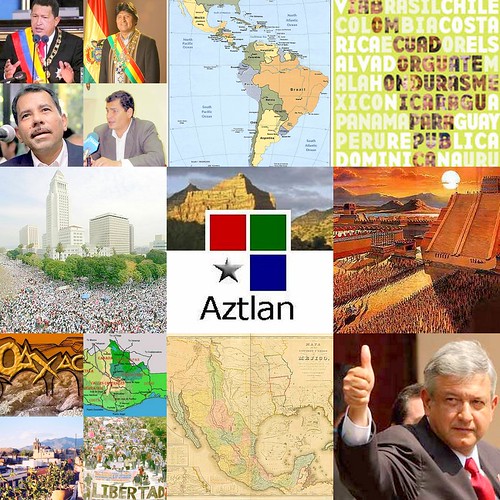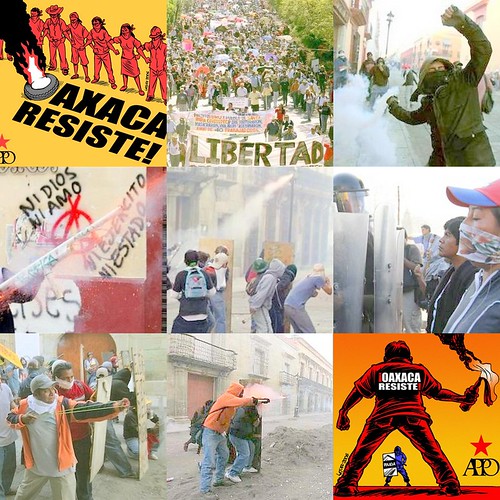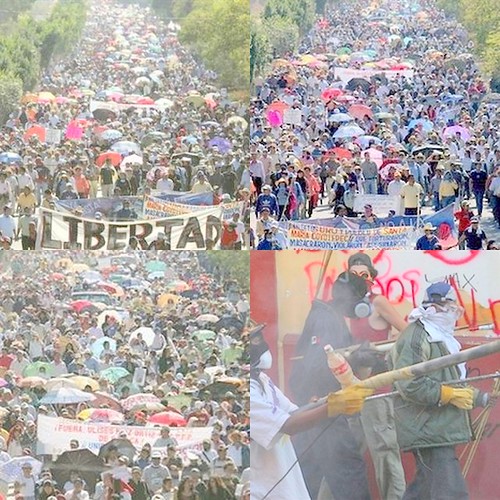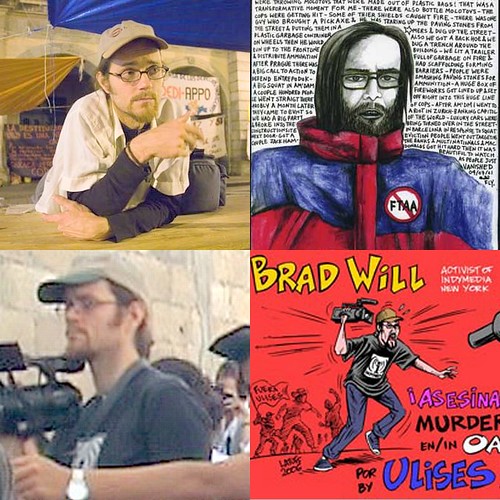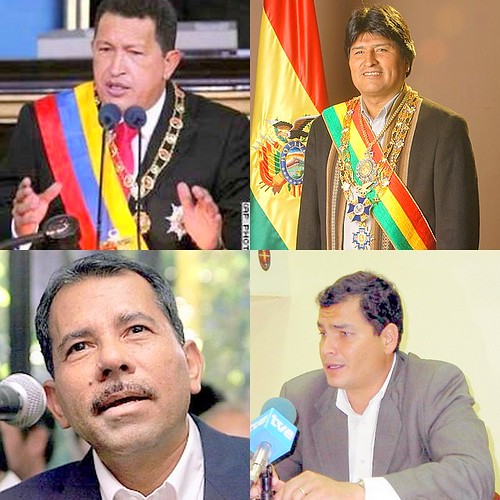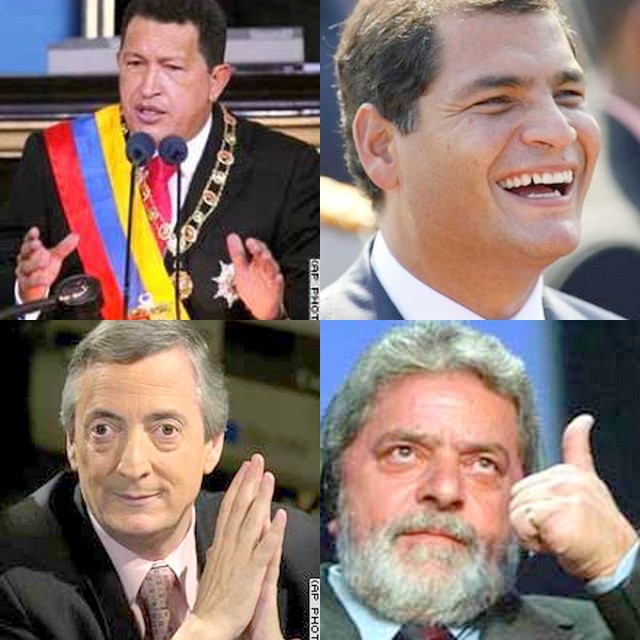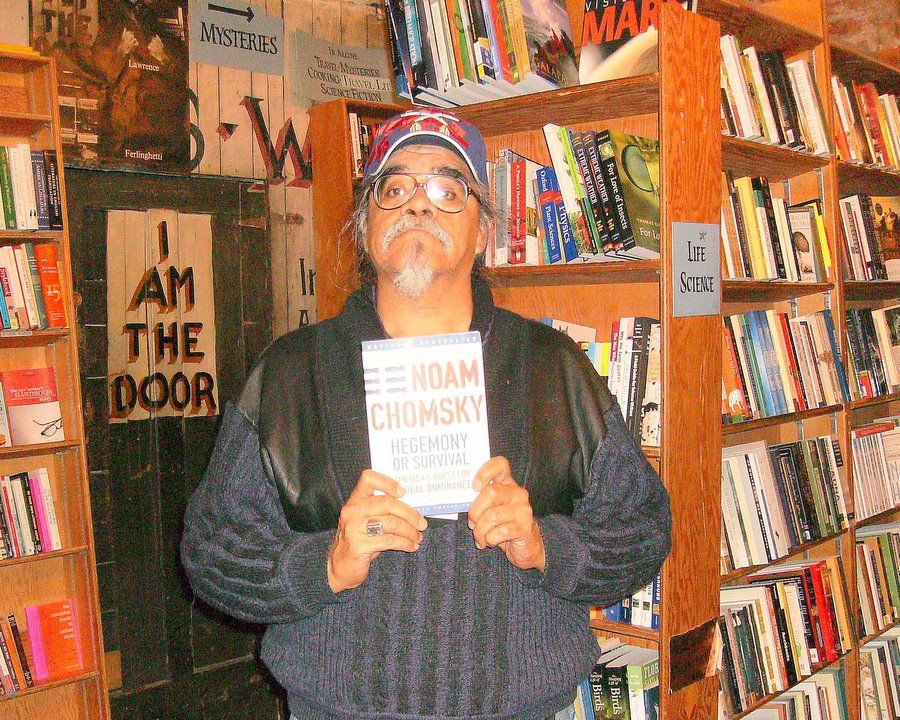

Wednesday, October 22nd, 2003
http://www.democracynow.org/article.pl?sid=03/10/22/1450216 “If you repeat it loudly enough it will become the truth” - MIT Institute Professor of Linguistics and author Noam Chomsky speaks out on U.S. hegemony, controlling the domestic population through fear and the historical parallels of current U.S. foreign policy. [Includes transcript]
Click here to read to full transcript
Anti-war protesters from across the country are planning to march in Washington and San Francisco this weekend to oppose the U.S. occupation in Iraq. The demonstrations are also timed to coincide with the second anniversary of the passing of the USA Patriot Act.
We spend the hour hearing a speech by institute professor and professor of linguistics at the Massachusetts Institute of Technology Noam Chomsky. He is the author of Hegemony or Survival: America’s Quest For Global Dominance, 9-11, Power and Terror and many other books.
TRANSCRIPT AMY GOODMAN: And you are listening to democracy now! As we turn to Noam Chomsky, Institute Professor of Linguistics of Massachusetts Institute of Technology. His latest book, "Hegemony or Survival? America‚s Quest for Global Dominance. He spoke at Illinois State University. This is Professor Noam Chomsky.
NOAM CHOMSKY: Let's start with a year ago, September, 2002, in the normal course of political life, academic life, September is usually an incipient month, a thing when important things begin to happen. September, 2002 was unusual in this respect. There were three very significant events closely related. One was the declaration of the National Securities Strategy, September 17. It announced very clearly and explicitly that the United States, at least this administration, intends to dominate the world permanently, if necessary, through the use of force. It's the one dimension in which the United States reigns completely supreme, probably now outspends the rest of the world combined or close to it in military expenditure, is far ahead in developing advanced and extremely dangerous technology. And it also announced that it will eliminate any potential challenge to that rule. So, it's to be permanent hegemony. That's the first event. That‚s not without precedent. There are interesting precedents. We don't have time to go into them unless you want to later, but this was unusual. It was correct for the reaction to be as extreme as it was, including the foreign policy elite here.
The second associated event was that in September, the war drums began to beat loudly about the planned invasion of Iraq. Early September, the National Security Adviser, Condoleezza Rice warned that the next evidence we were likely to have about Saddam Hussein will be a mushroom cloud, presumably over New York, no matter how much everyone else may have hated him outside the United States, no one feared him, including his neighbors who had been trying to reintegrate Iraq back into the region, who despised him, including the country he invaded but didn't fear him. That was unique to the United States, beginning last September. So, first there's going to be a mushroom cloud and then the propaganda campaign began very loud. The invasion of Iraq that was planned was understood to be what sometimes is called an exemplary action, that is, it's an action intended to demonstrate dramatically that the doctrine that had been announced is intended seriously. It's not enough to just promulgate a doctrine. If you want people to take you seriously, you have to do something to show that you mean it.
The invasion of Iraq was understood correctly to be a test case, a demonstration case of the doctrine that the U.S. government arrogates to itself the right to attack any country it wants without credible pretext or without any international authorization. In fact, the National Security Strategy is, as commentators quickly pointed out, doesn't even mention international law and the United Nations charter. In fact, the Bush administration proceeded to make it very clear to the Security Council of the United Nations that they had two choices. They could be irrelevant, that was the term that was used, by authorizing the United States to use force as it wished, or they could be a debating society, as Colin Powell, the administration moderate, pointed out.
He -- Powell was also delegated to address the World Economic Forum in Davos Switzerland the following January. This was -- you know what that is. that's the group that -- the business press only semi-ironically calls the masters of the universe. The people who own the world, the corporate executives who are spending $30,000 for the privilege of attending and other great and important figures. The mood in Davos was completely different than any of the earlier meets. It was very angry. The top issue was Iraq. They were strongly opposed to it, just like the rest of the world. Powell faced a very hostile audience, and he -- they were not eager to accept his message, which was, as he put it, that the United States has the sovereign right to use military force when we feel strongly about something. We will lead, even if nobody else is following. We will do it because we have the power to do it, and if you don't like it, too bad. The further comments for the -- from the administration to the Security Council and others were we're not going to ask for any authorization from you. You can catch up, is the term that was used, and authorize us to do what we are going to do anyway, or you're irrelevant.
That was reiterated very brazenly at the Azores summit, the Bush-Blair summit a couple of days before the actual invasion. They met at a military base on the Azores so they wouldn't have to face mass popular opposition, which would have happened anywhere else. They declared -- they issued an ultimatum not to Iraq, but to the United Nations. The ultimatum was, give us your stamp of approval for what we're going to do anyway, or else just go off and be a debating society. They also made it clear that it didn't matter whether Saddam Hussein and his cohorts stayed in Iraq or not, as Bush announced, even if Saddam and his family and associates leave, we're going to invade anyway. because the goal is to -- for us to control Iraq. That's my words, not his. The rest is his words. It's all very clear and explicit. You cannot miss it. It wasn't missed. I'll come back to that.
The third event, before I come back to it, in September closely related is that the congressional election campaign opened, the mid-term election campaign. The main sort of campaign adviser for the Republican Party, Karl Rove, one of the most important people in Washington, he had already the preceding summer, the summer of 2002, he had instructed party activists that in going into the electoral campaign, they're going to have to emphasize national security issues. They cannot expect to enter a political confrontation with -- if economic and social policies are prominent on the agenda because their policies are extremely unpopular, which is not surprising since they are designed to be extremely harmful to the general population, and people know that, and also to future generations. and you cannot go into a political campaign with that kind of a platform.
So, therefore, it had to be national security issues. on the assumption that people would shift their priorities and vote for the -- those who were going to protect them from imminent destruction. Well, for the elections it barely worked. By a few tens of thousands of votes, in fact, but enough to allow them a bare hold on political power. The voters preferences at the polls remained, as exit pole polls revealed, remained the same, but priorities shifted, and enough people huddled under the umbrella of power and fear of the demonic enemy so that they could maintain control, barely.
Well, that illustrates one of the dilemmas of dominance that I had in mind. one problem is how do you control the domestic population. The great beast, as Alexander Hamilton called the people. They're always a problem. The beast is always getting out of control. One of the main problems of governance, I'm sure you study this in all of your political science courses, is how do you keep the great beast in a cage?
That's particularly difficult when you're dedicated passionately to carrying out policies that are in fact going to be very harmful to the mass of the population, and to future generations. Then it's difficult, and only one effective way has ever been discovered by the people in office now, or anyone else under those conditions, and that is inspire fear. If you can do that, maybe you can get away with it. And for the people in office now, it's second nature. It's important to remember this.
It's kind of striking that it hasn't been discussed extensively, but if you think for a minute, the people -- the present incumbents in Washington are almost entirely recycled from the Reagan and first Bush administration. In fact, from their more reactionary sectors, or else their immediate teams, especially that administration. They're following pretty much the same script as the first 12 years they had in political power. In both domestically and internationally. You can learn a lot about what they're doing by just paying attention to what happened in those 12 years. They were in fact pursuing policies that were highly unpopular. Reagan's policies were strongly opposed by the population, but they did keep voting for him. Mainly out of fear. They continually pressed the panic button every year or two. I'll come back to that. Reagan in fact ended up in 1992 being the most unpopular living U.S. president next to Nixon. Ranked slightly above Nixon, well below Carter and even below the almost forgotten Ford. But they did manage to hang on for 12 years, and they're following essentially the same script. Well, except with much more arrogance and commitment and optimism, feeling they can do things that they couldn't get away with then for various reasons.
AMY GOODMAN: You're listening to Professor Noam Chomsky, speaking at Illinois state university. Back with Professor Chomsky in a minute.
[MUSIC BREAK]
AMY GOODMAN: And you are listening to Democracy Now!, the war and peace report, as we return to the speech of Noam Chomsky. He gave it October 7th at Illinois State University. Author of "Hegemony or Survival: America's Quest for Global Dominance." Noam Chomsky.
NOAM CHOMSKY: Well, let's go back to the other two major events of September, the national security strategy and the invasion of Iraq. It was understood that this is to be -- as The New York Times put it, after the war, though it was obvious it was before, that this was to be the first test of the national security strategy, not the last. The invasion of Iraq, they pointed out, is the petri dish for an experiment in preemptive attack. The term -- and that was understood around the world. There was huge protest around the world, in the United States, too, completely without any historical precedent, and it wasn't just over the invasion of Iraq.
That was the same in Davos, it's the same in the foreign Policy elite here. It was partly that, but more because of the general strategy of which Iraq is to be an exemplary action. It's supposed to create a new norm in international relations, which only those with the guns can implement, of course. And it struck plenty of fear in the world. That's mainly what the protest was about. Well, the phrase that the Times used -- preemptive strike, preemptive attack -- is conventional, but completely wrong.
Preemptive war has a meaning in international law. It's kind of on the border of legality. If you think about the UN charter, it authorizes the use of force under one condition -- two conditions, either the Security Council calls for it, or in self-defense against armed attack until the Security Council has a chance to act. And that has a sort of fringe of judgment. So, for example, if, say, Russian bombers were flying across the Atlantic with the obvious intent of bombing the United States it would be legitimate under -- it would be interpreted as legitimate under Article 51 to shoot them down before they bomb. Maybe even to attack the base they were coming from. That's a preemptive strike. It's a military action taken against an imminent attack when no other possibility is open, and there's enough time to notify the Security Council. That's preemptive war. But that's not what's being proposed.
Sometimes it's called more accurately, preventive war, or anticipatory self-defense. Well, that's at least not completely wrong, but it's also mostly wrong. There's nothing that has to be prevented. And there's no self-defense involved. The prevention is against an imagined or invented threat. There was no threat of attack from Iraq. That was farcical. What's called for is not even preventive war, as the more cautious commentators point out, or anticipatory self-defense. In fact, it's just straight, outright aggression. What was called the supreme crime at Nuremberg, the most serious of all crimes. That's what the doctrine announces. We have the right to carry out the supreme crime of Nuremberg and we'll count on international lawyers and respectable intellectuals to pretty it up and make it look like something else. But, essentially, that's what it comes down to and that's the way it was understood. It was understood here, too, by people who care about the country. The most extreme condemnation of the war that I came across was right from the middle of the mainstream when the U.S. bombed -- when the bombing began, Arthur Schlesinger, a very respectable senior American historian, highly respected, one of Kennedy's advisers, had an article in which he said that the bombing of Iraq resembles the actions of imperial Japan at Pearl Harbor on a date, which the President at the time said, the date that will live in infamy. And he said President Roosevelt was correct. It's a date that will live in infamy, except that now it's Americans who live in infamy, and the world knows it. That's the reason why the sympathy and solidarity with the United States that was evident after 9-11 has turned into a wave of revulsion and fear, and often hatred, which is horrible in itself and also an extreme danger.
Well, he was not alone. The national security strategy aroused many shudders worldwide. That included the foreign policy elite at home. Right away, within weeks, the main establishment journal, Foreign Affairs -- the Council on Foreign Relations, ran an article by a well-known international relations scholar, in which he warned that the imperial grand strategy, as he called it, posed great dangers to the world, and to the population of the United States. The United States was declaring itself, he said, to be a revisionist state that is tearing to shreds the framework of international law and institutions. And the effect of that is -- and hoping, expecting to be able to permanently dominate the world by force, but he said, it's not going to work. Aside from being wrong, it's going to lead to efforts on the part of potential victims to counter it. They're not going to sit there and wait to be destroyed. They can't compete with the United States in military force -- nobody can -- but there are weapons of the weak. Two primarily. One is weapons of mass destruction, which by now are becoming weapons of the weak, and the other is terror.
So, he and many other foreign policy analysts and intelligence agencies pointed out that the strategy is essentially calling for proliferation of weapons of mass destruction, and increase in terror. And hence, a great danger to the world altogether, but to the United States in particular. The war in Iraq was understood exactly the same way. The U.S. and British intelligence agencies -- the British ones have just been exposed in the Hutton inquiry in London, but there were enough leaks before. Both the British and the U.S. intelligence agencies, and other intelligence agencies, and plenty of independent analysts, and any one you pick, predicted that one likely consequence of the Iraq invasion would be proliferation of weapons of mass destruction, and terror.
Many commentators have pointed out that it's pretty likely that the Iranian and North Korean actions, since our response to the threat of the national security strategy and its implementation, are turning to the weapons that are available to them -- weapons of mass destruction. The U.S., indeed, made that very clear. There was a very clear and ugly lesson taught to the world last winter. North Korea is a far more vicious and ugly and dangerous state then Iraq, bad as Saddam Hussein was. But the U.S. wasn't going to attack North Korea. It was going to attack Iraq as the exemplary action. In part, that's because Iraq's just a lot more important. It's right in the center of the oil-producing region, but in part it's because Iraq was understood to be completely defenseless. If you have any brains, you don't attack anybody who can defend themselves. That's stupid. You want to attack somebody that's completely defenseless, and Iraq was known to be completely defenseless. That's why nobody was afraid of it, much as they might have hated it.
North Korea, on the other hand, had a deterrent. The deterrent was not nuclear weapons. It was conventional weapons -- massed artillery on the DMZ, the border with South Korea. Extensive massed artillery aimed at the capital, Seoul, South Korea, and at the U.S. troops in the south. Unless the Pentagon can figure out a way to get rid of that with precision weapons, or something or other, that is a deterrent to a U.S. attack. In fact, U.S. troops have since been withdrawn from the DMZ. And that's caused plenty of concern in both South and North Korea and the region, suggesting a very cynical strategy. You can figure it out. But what the U.S. was telling the world is if you don't want us to attack you and destroy you, you better have some kind of deterrent. And for most of the world, that's going to mean weapons of mass destruction. And terror.
The result of the war, as far as we know, verified that near-universal prediction of intelligence agencies and analysts. It's been pointed out since, that, to quote a few, that the Iraq war was a huge setback for the war on terror, led to a sharp spike in recruitment for Al Qaeda and other terrorist groups, and in fact Iraq itself was turned into a haven for terrorists for the first time. It wasn't before, but now it is.
That was expected and that's another dilemma of dominance. You have to control the great beast at home, and while violence is an effective device and may intimidate many people and countries, it's likely to incite others -- to incite them to revenge or simply to find means of deterrence. And since no one can think of competing with the United States in military power, well, that leaves the weapons of the weak, weapons of mass destruction, and terror, and those may sooner or later be united. That's been predicted for years with contemporary technology. It's not that hard for terrorist groups with a low level of financing and sophistication to gain access to even nuclear weapons, small nuclear weapons. The chances of -- the possibilities of smuggling them into the United States are overwhelming. If you are interested in having a sleepless night, you can read some of the high-level studies that have been coming out for the past six or seven years, well before 9-11, but increasingly, which are virtually cookbooks for terrorists. I mean, they're the kind of things that I suspect we could do if we wanted to.
And maybe impossible to stop for all kind of reasons. The Hart-Rudman report, which came out about a year ago, Gary Hart and Warren Rudman, two former senators, a high-level study of threats -- on threats of terror that gives one of many such examples. So, yeah, sooner or later, weapons of mass destruction and terror will be united. And the consequences could be quite horrific. Well, all of that is the likely consequence predicted, and, so far, happening of the security strategy in the test case, the dramatic test case to illustrate it.
Well, administration planners know all of this as well as everyone else. I mean, they're intelligent, literate. They read the same intelligence reports everyone else does. So, they know, yes, the policies they're carrying out are increasing the threat to the security of the American people, and the world and, of course, future generations. And they don't want that. They don't want that outcome. It just doesn't matter very much. If you look at the ranking of priorities, it just doesn't rank very high. Likely that it could happen, but other things are just more important. The things that are more important are establishing global hegemony and carrying out the highly regressive domestic policies of trying to roll back the New Deal and the progressive legislation of the past century, in fact. And creating a very different kind of domestic society, one that most of the public passionately opposes, but may accept under the threat of destruction, manufactured and some increasingly real.
Well, this, again, gets back to the first dilemma, how do you control the domestic public, the great beast? In particular, the problem now is winning the 2004 election. Remember that they have a very narrow hold on political power. You all know that the 2000 election was disputed. The 2002 election was barely -- barely managed to sneak through, and now we're up to 2004, and what do we do with that? Well, go back to last May. On the first of May, you remember, there was a carefully staged extravaganza which elicited ridicule and fear throughout the world, but was played pretty seriously here when the President landed on the Abraham Lincoln aircraft carrier wearing combat gear and posing and so on and so forth. It was pretty frightening for the world. Here it played pretty straight. He gave a victory speech. We won a victory over in Iraq. Now, the front page story in The New York Times used a phrase that I'll come back to, and it's important. They said, "it was a powerful Reaganesque finale to the war in Iraq." We'll come back to that.
More astute observers pointed out that the extravaganza was the opening of the 2004 election campaign, which must be built on national security themes. That's The Wall Street Journal. Karl Rove, same guy, announced right away that the 2004 Election is -- the main theme is going to have to be what he called the battle of Iraq, and he emphasized battle. The battle of Iraq, not the war. It's an episode in the war on terror, which must continue. And, in fact, if you look at the President's declaration on the Abraham Lincoln, he said that we have won a victory in the war on terror by removing an ally of Al Qaeda. Notice that it's immaterial that there is not the slightest evidence of any connection between Saddam Hussein and his bitter enemy, Osama bin Laden, and the idea of a connection is dismissed by every competent authority, including the intelligence agencies, but it doesn't matter. It's a higher truth. All you have to do is repeat it loudly enough and often enough. Facts are irrelevant. In particular, the specific facts -- again, they didn't invent this formula. It's not pleasant to think about the antecedents, but they're there. It's also irrelevant, specifically, that there is actually a Connection between the war on terror and the invasion of Iraq, and namely, the invasion increased threat of terror, exactly as predicted. But it just doesn't make any difference and it continues.
AMY GOODMAN: You're listening to Noam Chomsky speaking at Illinois State University on October 7th. Noam Chomsky's latest book is, "Hegemony or Survival: America's Quest for Global Dominance." You can get more information on democracynow.org. We'll return to the speech in a minute.
[MUSIC BREAK]
AMY GOODMAN: You're listening to Democracy Now! I'm Amy Goodman. We return to the speech of Noam Chomsky; author of many books. Noam Chomsky speaking at Illinois State University.
NOAM CHOMSKY: A week or so ago, in his weekly presidential radio address, President Bush, September 28 said, "the world is safer today because our coalition ended a regime that cultivated ties to terror while it built weapons of mass destruction."
Well, his speechwriters and his minders and trainers know very well that every word there was an outrageous lie. But why should it matter? If you repeat it loudly enough, it will become the truth.
Well, how can Karl Rove hope to get away with it? Just have a look back at what just happened in September 2002: the last election campaign.
That, as I said, was the beginning of an onslaught of government media propaganda, which had a very substantial effect. By the end of the month, by the end of September, about 60% of the population regarded Iraq as a serious threat to the security of the United States.
Remember, the United States is alone in this respect. In Kuwait and Iran, which Saddam invaded, they're not afraid of him. They're not afraid of him because they know exactly what U.S. intelligence and everyone else knows - Iraq was the weakest country in the region. It had been devastated by the U.S. sanctions, which are called U.N. sanctions, but if it wasn't for U.S. pressure, they wouldn't exist. They wiped out the population. They happened to strengthen the tyrant, but devastated the economy. The country was virtually disarmed. It was under total surveillance. Its military budget was about a third that of Kuwait, which has 10% of its population, and far below the other states in the region, including, of course, the regional superpower, which we're not allowed to talk about, because there's an offshore U.S. military base, but outside the United States everyone knows there is one country in the region that has extensive weapons of mass destruction, and has military forces which according to its own analysts are more technically advanced and more powerful than those of any NATO country outside the United States, unmentionable here, but known everywhere else.
That's the -- and Iraq isn't even in the league of Kuwaits, let alone anything like that.
So it, wasn't -- certainly not a threat, but by the end of September, as a result of a propaganda campaign of quite impressive character, government campaign transmitted uncritically by the media, about 60% of the population believed there was a threat. Then -- pretty soon after that, the proportion of the population that believed that Iraq was involved in 9-11, maybe responsible for it, went up to 50% or higher, depended how you asked the question.
Also the belief that Iraq was -- had interrelations with al Qaeda and other gross misperceptions which are rejected by every intelligence agency, including the U.S.. But it did become -- it did work domestically, not anywhere else.
That's the media -- the media behavior was kind of -- let me quote a non-controversial source, the very respectable "Bulletin of the Atomic Scientists". The editor wrote recently, "the charges dangled in front of the media failed the laugh test, but the more ridiculous they were, the more the media strove to make whole-hearted swallowing of them a test of patriotism."
It's pretty accurate and it sort of worked, only domestically and -- and only in part, because it was because of part of the population. The rest of the population was overwhelmingly opposed to the war at a level that literally has no precedent, but it worked enough to sneak by the election and to build up a base of support for the war. Not surprisingly, a belief in these fantasies was highly correlated with support for the war, as you would expect. If you believe those things, they're right. Well, that's significant.
Congress, in October, right after the propaganda campaign began, passed a resolution authorizing the government to resort to force to defend the United States against the continuing threat of Iraq.
Again, remember, the United States is the only country that was under that threat, but congress passed it. The media and commentators and in the intellectual world were silent about the fact, I presume they were aware of, that the congressional resolution was a copy. They're still following the script.
In 1985, president Reagan declared a national emergency in the United States because of -- I'm quoting, “the usual and extraordinary threat to the security of the United States posed by the government of Nicaragua.” Which was two days' driving time from Arlington, Texas.
We had the quake and fear before that. Notice, that's much more severe than Iraq. That was an unusual and extraordinary threat.
In fact, Reagan went on to a press conference where he said that I know the enormous odds against me, but I remember a man named Churchill and he stood up against terrific odds, fought Hitler, and I'm not going to give up, never, never, never, despite the hoards of Nicaraguans invading us and about to conquer us.
That passed the laugh test in the United States. If you check back, just report it. People were afraid. The rest of the world could not believe it, but it happened, and it's another reason why they expect that they can do it again. That helps explain the confidence.
It and wasn't the only case. Through the 1980's, year after year there was one or another threat of that nature. Libyan hit-men were wandering the streets of Washington about to assassinate our leader, who was holed up in the White House, surrounded by tanks. The Russians were going to build an airbase in the nutmeg capital of the world, Grenada, if they could find it on a map, and they were going to bomb us.
That brings us back to the New York Times phrase, "powerful Reagan-esque finale."
What are they referring to? Well, they know what they're referring to. They're referring to Reagan's speech after the United States - after the brave cowboy barely saved us from destruction from the Grenadians by sending thousands of forces who were able to overcome a couple of middle aged construction workers and one -- but then there was a speech saying, "we're standing tall.”
That's the powerful Reagan-esque finale that The New York Times is referring to. Maybe the reporter is being ironic, I don't know, but what gets to the public is the message, not what's in the person's mind. The message is, “we're in constant danger.”
After Grenada, it was Libya again, and after that, it was domestic threats.
George Bush Sr. won his election by straight pulling the race card. Willie Horton, the black rapist is going to come after you, notice you put me in. Crime in the United States is like other industrial countries, but fear of crime is off the spectrum.
Same with drugs. Drugs - yeah - problem. In other countries it is about the same as here, but fear of drugs is far higher here and it's constantly manipulated by unscrupulous politicians and obedient media, and you get continual hysteria about drugs and Nicaraguans on the march, and Grenadians and the rest.
There's confidence. They were able to hold power for years, over and over, despite the fact that the population was harmed by the domestic policies and opposed them, but they stayed in office.
Now, they are much more confident. Well, there's quite a lot at stake for them. It's not just a matter of narrow political gain. What's at stake is world domination by force, and also control of the majo
www.democracynow.org+++++++++++++++++++++++++++++++++++++++++++++++
+
http://bostonreview.net/BR28.5/chomsky.html
Dominance and Its Dilemmas
The Bush administration’s Imperial Grand Strategy
Noam Chomsky
8 The past year has been a momentous one in world affairs. In the normal rhythm of political life, the pattern was set in September of 2002, a month marked by several important and closely related events. The most powerful state in history announced a new National Security Strategy, asserting that it will maintain global hegemony permanently: any challenge will be blocked by force, the dimension in which the United States reigns supreme. At the same time, war drums began to beat to mobilize the population for an invasion of Iraq, which would be “the first test [of the doctrine], not the last,” the New York Times observed after the invasion, “the petri dish in which this experiment in pre-emptive policy grew.”1 And the campaign opened for the midterm congressional elections, which would determine whether the administration would be able to carry forward its radical international and domestic agenda.
The basic principles of this new “imperial grand strategy,” as it was aptly termed at once by John Ikenberry, trace back to the early days of World War II and have been reiterated frequently since. Even before the United States entered the war, planners and analysts concluded that in the postwar world it would seek “to hold unquestioned power,” acting to ensure the “limitation of any exercise of sovereignty” by states that might interfere with its global designs. They outlined “an integrated policy to achieve military and economic supremacy for the United States” in a “Grand Area” to include at a minimum the Western Hemisphere, the former British empire, and the Far East, later extended to as much of Eurasia as possible when it became clear that Germany would be defeated.2
Twenty years later, elder statesman Dean Acheson instructed the American Society of International Law that no “legal issue” arises when the United States responds to a challenge to its “power, position, and prestige.” He was referring specifically to Washington’s post–Bay of Pigs economic warfare against Cuba, but he was surely aware of Kennedy’s terrorist campaign aimed at “regime change,” a significant factor in bringing the world close to nuclear war only a few months earlier and a course of action that was resumed immediately after the Cuban missile crisis was resolved.
A similar doctrine was invoked by the Reagan administration when it rejected World Court jurisdiction over its attack against Nicaragua. State Department Legal Adviser Abraham Sofaer explained that most of the world cannot “be counted on to share our view” and “often opposes the United States on important international questions.” Accordingly, we must “reserve to ourselves the power to determine” which matters fall “essentially within the domestic jurisdiction of the United States”—in this case, the actions that the Court condemned as the “unlawful use of force” against Nicaragua; in lay terms, international terrorism.
Their successors have continued to make it clear that the United States reserves the right to act “unilaterally when necessary,” including “unilateral use of military power” to defend such vital interests as “ensuring uninhibited access to key markets, energy supplies and strategic resources.”3
Even this small sample illustrates the narrowness of the planning spectrum. Nevertheless, the alarm bells sounded in September 2002 were justified. Acheson and Sofaer were describing policy guidelines, within elite circles. Other cases may be regarded as worldly-wise reiterations of the maxim of Thucydides that “large nations do what they wish, while small nations accept what they must.” In contrast, Cheney-Rumsfeld-Powell and their associates are officially declaring an even more extreme policy. They intend to be heard, and took action at once to put the world on notice that they mean what they say.
That is a significant difference.
The imperial grand strategy is based on the assumption that the United States can gain “full spectrum dominance” through military programs that dwarf those of any potential coalition and that have useful side effects. One is to socialize the costs and risks of the private economy of the future, a traditional contribution of military spending and the basis of much of the “new economy.” Another is to contribute to a fiscal train wreck that will, it is presumed, “create powerful pressures to cut federal spending, and thus, perhaps, enable the administration to accomplish its goal of rolling back the New Deal,”4 a description of the Reagan program that is now being extended to far more ambitious plans.
As the grand strategy was announced on September 17, the administration “abandoned an international effort to strengthen the Biological Weapons Convention against germ warfare,” advising allies that further discussions would have to be delayed for four years.5 A month later, the U.N. Committee on Disarmament adopted a resolution that called for stronger measures to prevent militarization of space, recognizing this to be “a grave danger for international peace and security,” and another that reaffirmed “the 1925 Geneva Protocol prohibiting the use of poisonous gases and bacteriological methods of warfare.” Both passed unanimously, with two abstentions, the United States and Israel. U.S. abstention amounts to a veto: typically, a double veto, banning the events from the news record and from history.
A few weeks later, the Space Command released plans to go beyond U.S. “control” of space for military purposes to “ownership,” which is to be permanent, in accord with the Security Strategy. Ownership of space is “key to our nation’s military effectiveness,” permitting “instant engagement anywhere in the world. . . . A viable prompt global strike capability, whether nuclear or non-nuclear, will allow the United States to rapidly strike high-payoff, difficult-to-defeat targets from stand-off ranges and produce the desired effect . . . [and] to provide warfighting commanders the ability to rapidly deny, delay, deceive, disrupt, destroy, exploit and neutralize targets in hours/minutes rather than weeks/days even when U.S. and allied forces have a limited forward presence,”6 thus reducing the need for overseas bases that regularly arouse local antagonism.
Similar plans had been outlined in a May 2002 Pentagon planning document, partially leaked, which called for a strategy of “forward deterrence” in which missiles launched from space platforms would be able to carry out almost instant “unwarned attacks.” Military analyst William Arkin comments that “no target on the planet or in space would be immune to American attack. The U.S. could strike without warning whenever and wherever a threat was perceived, and it would be protected by missile defenses.” Hypersonic drones would monitor and disrupt targets. Surveillance systems would provide the ability “to track, record and analyze the movement of every vehicle in a foreign city.”7 The world is to be left at mercy of U.S. attack at will, without warning or credible pretext. The plans have no remote historical parallel. Even more fanciful ones are under development.
These moves reflect the disdain of the administration for international law and institutions and for arms control measures, dismissed with barely a word in the National Security Strategy. They illustrate a commitment to an extremist version of long-standing doctrine.
Since the mid-1940s, Washington has regarded the Persian Gulf as “a stupendous source of strategic power, and one of the greatest material prizes in world history”—in Eisenhower’s words, the “most strategically important area of the world” because of its “strategic position and resources.” Control over the region and its resources remains a policy imperative. After taking over a core oil producer, and presumably acquiring its first reliable military bases at the heart of the world’s major energy-producing system, Washington will doubtless be happy to establish an “Arab façade,” to borrow the term of the British during their day in the sun. Formal democracy will be fine, but if history and current practice are any guide, only if it is of the submissive kind tolerated in Washington’s “backyard.”
To fail in this endeavor would take real talent. Even under far less propitious circumstances, military occupations have commonly been successful. It would be hard not to improve on a decade of murderous sanctions that virtually destroyed a society that was, furthermore, in the hands of a vicious tyrant who ranked with others supported by the current incumbents in Washington, including Romania’s Ceausescu, to mention only one of an impressive rogues’ gallery. Resistance in Iraq would have no meaningful outside support, unlike in Nazi-occupied Europe or Eastern Europe under the Russian yoke, to take recent examples of unusually brutal states that nevertheless assembled an ample array of collaborators and achieved substantial success within their domains.
The new grand strategy authorizes Washington to carry out “preventive war.” Whatever the justifications for pre-emptive war may sometimes be, they do not hold for preventive war, particularly as that concept is interpreted by its current enthusiasts: the use of military force to eliminate an invented or imagined threat, so that even the term “preventive” is too charitable. Preventive war is, very simply, the “supreme crime” condemned at Nuremberg.
That is widely understood. As the United States invaded Iraq, Arthur Schlesinger wrote that Bush’s grand strategy is “alarmingly similar to the policy that imperial Japan employed at Pearl Harbor, on a date which, as an earlier American president said it would, lives in infamy.” FDR was right, he added, “but today it is we Americans who live in infamy.” It is no surprise that “the global wave of sympathy that engulfed the United States after 9/11 has given way to a global wave of hatred of American arrogance and militarism” and to the belief that Bush is “a greater threat to peace than Saddam Hussein.”8
For the political leadership, mostly recycled from more reactionary sectors of the Reagan–Bush I administrations, “the global wave of hatred” is not a particular problem. They want to be feared, not loved. They understand as well as their establishment critics that their actions increase the risk of proliferation of weapons of mass destruction (WMD) and terror. But that too is not a major problem. Higher on the scale of priorities are the goals of establishing global hegemony and implementing their domestic agenda: dismantling the progressive achievements that have been won by popular struggle over the past century and institutionalizing these radical changes so that recovering them will be no easy task.
It is not enough for a hegemonic power to declare an official policy. It must establish it as a “new norm of international law” by exemplary action. Distinguished commentators may then explain that law is a flexible, living instrument, ensuring that the new norm is available as a guide to action. It is understood that only those with the guns can establish “norms” and modify international law.
The selected target must meet several conditions. It must be defenseless, important enough to be worth the trouble, and an imminent threat to our survival and ulitimate evil nature. Iraq qualified on all counts. The first two conditions are obvious. For the third, it suffices to repeat the orations of Bush, Blair, and their colleagues: The dictator “is assembling the world’s most dangerous weapons [in order to] dominate, intimidate or attack”; and he “has already used them on whole villages leaving thousands of his own citizens dead, blind or transfigured. . . . If this is not evil then evil has no meaning.”
President Bush’s eloquent denunciation surely rings true. And those who contributed to enhancing evil should certainly not enjoy impunity: among them, the speaker of these lofty words, his current associates, and those who joined them in the years when they were supporting the man of ultimate evil long after he had committed these terrible crimes and won the war with Iran, with decisive U.S. help. We must continue to support him, the Bush I administration explained, because of our duty to help U.S. exporters.
It is impressive to see how easy it is for political leaders, while recounting the monster’s worst crimes, to suppress the crucial words “with our help, because we don’t care about such matters.” Support shifted to denunciation as soon as their Iraqi friend committed his first authentic crime: disobeying (or perhaps misunderstanding) orders by invading Kuwait. Punishment was severe—for his subjects. The tyrant escaped unscathed, and his grip on the tortured population was further strengthened by the sanctions regime then imposed by his former allies.
Also easy to suppress are the reasons why Washington returned to supporting Saddam immediately after the Gulf War as he crushed rebellions that might have overthrown him. The chief diplomatic correspondent of the New York Times explained that “the best of all worlds” for Washington would be “an iron-fisted Iraqi junta without Saddam Hussein,” but since that goal seems unattainable, we must be satisfied with the second best. The rebels failed because Washington and its allies held that “whatever the sins of the Iraqi leader, he offered the West and the region a better hope for his country’s stability than did those who have suffered his repression.”9 All of this is suppressed in the commentary on the mass graves of the victims of Saddam’s U.S.–authorized paroxysm of terror, crimes that are now offered as justification for the war on “moral grounds.”10 It was all known in 1991 but ignored for reasons of state: successful rebellion would have left Iraq in the hands of Iraqis.
Within the United States, a reluctant domestic population had to be whipped into a proper war fever, another traditional problem. From early September 2002, grim warnings were issued about the threat Saddam posed to the United States and about his links to al Qaeda, with broad hints that he was involved in the 9/11 attacks. Many of the charges “dangled in front of [the media] failed the laugh test,” the editor of the Bulletin of the Atomic Scientists, Linda Rothstein, commented, “but the more ridiculous [they were], the more the media strove to make wholehearted swallowing of them a test of patriotism.”
As has often happened in the past, the propaganda assault had at least short-term effects. Within weeks, a majority of Americans came to regard Saddam Hussein as an imminent threat to the United States. Soon almost half believed that Iraq was behind the 9/11 terror. Support for the war correlated with these beliefs. The propaganda campaign proved just enough to give the administration a bare majority in the midterm elections, as voters put aside their immediate concerns and huddled under the umbrella of power in fear of the demonic enemy.
Despite its narrow successes, the intensive propaganda campaign left the public unswayed in more fundamental respects. Most continue to prefer U.N. rather than U.S. leadership in international crises, and by two to one prefer that the U.N., rather than the United States, should direct reconstruction in Iraq.11
When the occupying army failed to discover WMD, the administration’s stance shifted from “absolute certainty” that Iraq possessed WMD to the position that the accusations were “justified by the discovery of equipment that potentially could be used to produce weapons.” Senior officials suggested a “refinement” in the concept of preventive war that entitles the United States to attack “a country that has deadly weapons in mass quantities.” The revision “suggests instead that the administration will act against a hostile regime that has nothing more than the intent and ability to develop [WMD].”12 The bars for resort to force are significantly lowered. This modification of the doctrine of “preventive war” may prove to be the most significant consequence of the collapse of the declared argument for the invasion.
Perhaps the most spectacular propaganda achievement was the lauding of the president’s “vision” to bring democracy to the Middle East in the midst of a display of hatred and contempt for democracy for which no precedent comes to mind. One illustration was the distinction between Old and New Europe, the former reviled, the latter hailed for its courage. The criterion was sharp: Old Europe consists of governments that took the same position as the vast majority of their populations; the heroes of New Europe followed orders from Crawford, Texas, disregarding an even larger majority in most cases. Political commentators ranted about disobedient Old Europe and its psychic maladies while Congress descended to low comedy.
At the liberal end of the spectrum, Richard Holbrooke stressed “the very important point” that the population of the eight original members of New Europe is larger than that of Old Europe, which proves that France and Germany are “isolated.” So it does, if we reject the radical left heresy that the public might have some role in a democracy. Thomas Friedman urged that France be removed from permanent membership on the Security Council because it is “in kindergarten” and “does not play well with others.” It follows that the population of New Europe must still be in nursery school, judging by polls.13
Anger at Old Europe has much deeper roots than contempt for democracy. The United States has always regarded European unification with some ambivalence because Europe might become an independent force in world affairs. Thus senior diplomat David Bruce was a leading advocate for European unification in the Kennedy years, urging Washington to “treat a uniting Europe as an equal partner”—but following America’s lead. He saw “dangers” if Europe “struck off on its own, seeking to play a role independent of the United States.”14 In his “Year of Europe” address 30 years ago, Henry Kissinger advised Europeans to keep to their “regional responsibilities” within the “overall framework of order” managed by the United States. Europe must not pursue its own independent course based on its Franco-German industrial and financial heartland.
In the tripolar world that was taking shape at that time, these concerns extend to Asia as well. Northeast Asia is now the world’s most dynamic economic region, accounting for almost 30 percent of global GDP (far more than the United States does) and holding about half of global foreign exchange reserves. It is a potentially integrated region with advanced industrial economies and ample resources. All of this raises the threat that it, too, might flirt with challenging the overall framework of order, which the United States is to manage permanently, by force if necessary, Washington has declared.
Violence is a powerful instrument of control, as history demonstrates. But the dilemmas of dominance are not slight.<
Noam Chomsky, professor of linguistics at MIT, is author most recently of Understanding Power, Middle East Illusions, and Hegemony or Survival (forthcoming).
Notes
1 David Sanger and Steven Weisman, New York Times, 10 April 2003.
2 Memorandum of the War and Peace Studies Project of the Council on Foreign Relations, with State Department participation, 19 October 1940. Laurence Shoup and William Minter, Imperial Brain Trust (Monthly Review Press, 1977), 130ff.
3 Dean Acheson, American Society of International Law Proceedings 13, 14 (1963); Abraham Sofaer, U.S. Department of State Current Policy 769 (December 1985); President Bill Clinton, address to the U.N., 1993; Secretary of Defense William Cohen, Annual Report, 1999.
4 Thomas Ferguson and Joel Rogers, Right Turn (Hill and Wang, 1986). On Clinton’s contribution see Michael Meeropol, Surrender: How the Clinton Administration Completed the Reagan Revolution (University of Michigan Press, 2000; updated 2003).
5 Peter Slevin, Washington Post, 19 September 2002.
6 Air Force Space Command “Strategic Master Plan (SMP) FY04 and Beyond,” 5 November 2002.
7 William Arkin, Los Angeles Times, 14 July 2002; Michael Sniffen, Associated Press, 1 July 2003.
8Los Angeles Times, 23 March 2003.
9 Thomas Friedman, New York Times, 7 June 1991. Alan Cowell, New York Times, 11 April 1991.
10 Thomas Friedman, New York Times, 4 June 2003.
11 Program on International Policy Attitudes (PIPA), University of Maryland, 18–22 April 2003.
12 Dana Milbank, Washington Post, 1 June 2003. Guy Dinmore and James Harding, Financial Times, 3–4 May 2003.
13 Lee Michael Katz, National Journal, 8 February 2003. Friedman, New York Times, 9 February 2003.
14 Frank Costigliola, Political Science Quarterly (Spring 1995).
© 2003 by Noam Chomsky. All rights reserved. Portions of this essay appeared in Le Monde diplomatique, August 2003.
Originally published in the October/November 2003 issue of Boston Review
<>+<>+<>+<>+<>+<>+<>+<>+<>+<>+<>+<>+<>+<>
Liberation Now!
http://liberation-now.blogspot.com/
Humane-Rights-Agenda Yahoo Group
http://groups.yahoo.com/group/Humane-Rights-Agenda/
<>+<>+<>+<>+<>+<>+<>+<>+<>+<>+<>+<>+<>+<>

